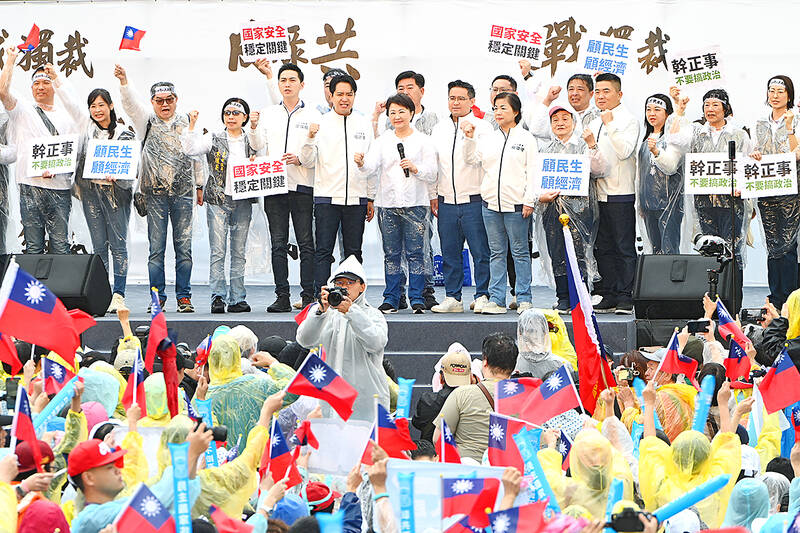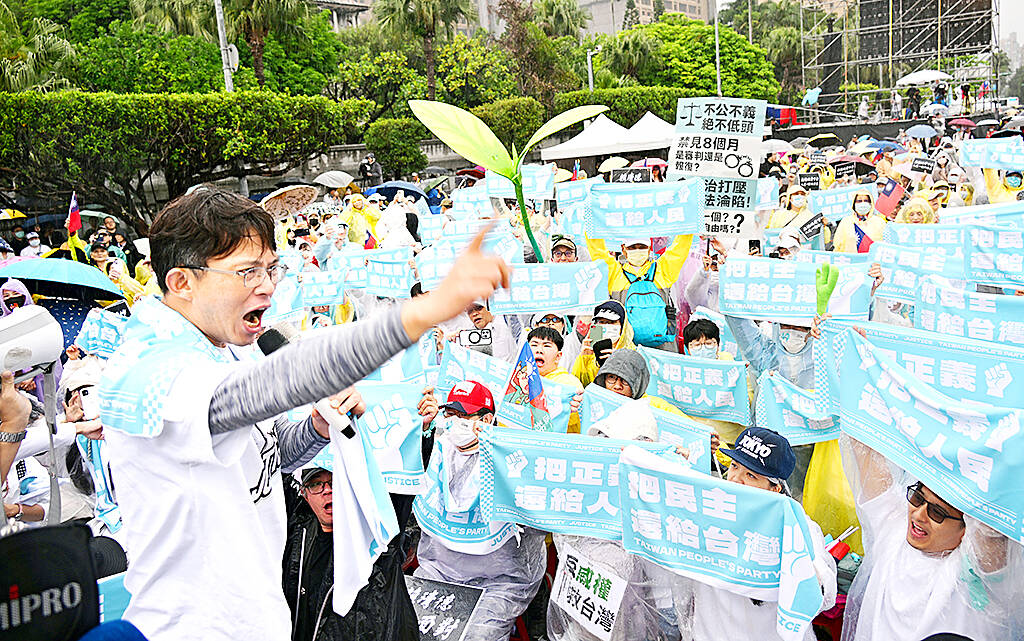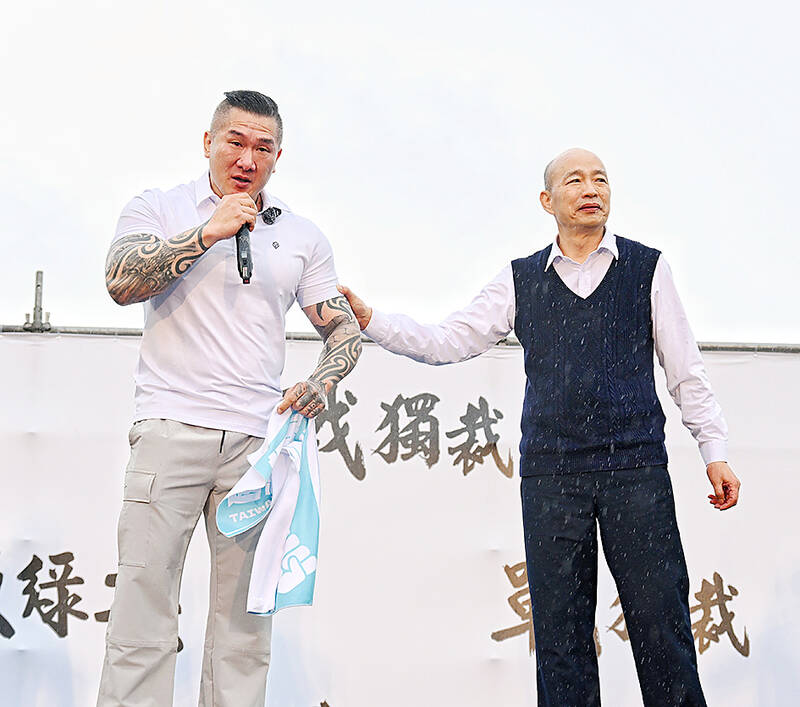At the end of the “Battle Dictatorship” rally on Saturday, Chinese Nationalist Party (KMT) Chairman Eric Chu (朱立倫) delivered a fiery speech and thanked the KMT heavyweights for their support. He then strode off the stage into the fired-up crowd like a conquering hero surrounded by adoring fans.
Despite the cross-partisan tradition in Taiwan of wildly inflating crowd numbers, this was an unambiguously large turnout. Everyone who is anyone in the KMT rallied to Chu’s call.
Giving all of them a chance to speak prolonged the event, but on balance this was a good problem for Chu to have. It sent a clear message that the party was unified behind their leader, who two weeks earlier had been perceived as ineffective.

Photo: Tien Yu-hua, Taipei Times
An outnumbered but still significant number of Taiwan People’s Party (TPP) supporters and politicians turned out. I was initially confused by a group of them holding up gold, birthday party-style balloons spelling out “FREEK P” until realizing that the spacing should have been “FREE KP,” referencing the “Ko P” nickname of their founder Ko Wen-je (柯文哲), who is currently on trial for alleged corruption.
A highly anticipated guest, legislative speaker Han Kuo-yu (韓國瑜), was as charismatic and full of self-deprecating humor, showing his man-of-the-people bona fides.
The DPP accused Han of breaching the neutrality of his position as speaker by attending the rally, and initially Han was slow to agree to appear, likely due to this concern.

Photo: Fang Pin-chao, Taipei Times
The rally, while undoubtedly a resounding success for both Chu and the KMT, raises the question: what’s next?
CHU GOES ALL IN ON THE BASE
Chu has been criticized as KMT leader about the failure of the KMT-backed recall campaigns to show much motivation or drive, and for their lackluster results in the face of far more successful pan-green campaigns. The KMT attempted to pump up the energy by proposing referendums on opposing martial law and ending the death penalty, but since there is no martial law and the death penalty is still in force, this motivated almost nobody.

Photo: Fang Pin-chao, Taipei Times
Chu’s impromptu rally at the Taipei prosecutors offices and use of new language like “green commies” did work in attracting the base’s attention. The fact that the rally was illegal only added to the drama.
He skillfully built up the excitement in the deep blue base over the last week and a half, culminating in Saturday’s rally. Does Chu have a plan to keep this momentum going? This bears watching, momentum is tricky to keep up, and he and his party will need all they can get this year.
While it is logical to pump up the base to drive recall and voting turnout in any by-elections, it also comes with risks.
Chu’s formulation “oppose red commies, oppose green commies” was meant to suggest that the KMT is also tough on the Chinese Communist Party (CCP) because he knows the public perception of the party being pro-Beijing is a big vote loser in national elections. But it didn’t catch on.
Chinese state-owned media praised the rally, but carefully avoided referencing “green commies.”
Chu might be sacrificing long-term interests for short-term goals. Previously he has been cautious about what he says, knowing that it could come back to haunt him.
He has now taken on the language of party extremists, which even light blues find a bit much.
“This dictator [President William Lai (賴清德)] is carrying out a Cultural Revolution in Taiwan — a green [DPP] Cultural Revolution aimed at eliminating all dissent,” Chu said, adding that the president was “more communist than the communists, more fascist than the fascists.”
He also proposed a recall campaign against Lai, which is a non-starter because it would require DPP lawmaker support.
If Chu wins re-election as party chair in September, his vitriolic attacks will resurface in DPP campaign advertising targeting his party as extremist. But it wasn’t just Chu — all but one of the speakers used extremist language.
The Presidential Office Building served as a backdrop to the rally, its tower rising high above the stage. Listening to the vitriol and accusations directed at the president, one half expected the eye of Sauron to materialize at the top of the tower and ring wraiths to fly out of the building to slay opposition party politicians.
LU SPEAKS TO THE MAINSTREAM
The one politician whose speech entirely lacked vitriol was presumptive 2028 KMT presidential candidate and Taichung Mayor Lu Shiow-yen (盧秀燕). She stuck to substance, warning of a “tsunami” of worldwide economic impact from US President Donald Trump’s tariffs and the effect it may have on business and people’s livelihoods.
In the middle of a rally describing President Lai as a dictator, a communist and a fascist it was jarring to hear her refer to his administration respectfully as “Taiwan’s leaders.” She appealed to these leaders with reasonable requests to prepare for the tariffs.
Lu’s moderate remarks did not get much reaction, the muted applause was polite.
Faced with this reaction, will Lu continue with her more moderate, constructive message for the broader public, or will she be tempted by the lure of passionate responses from a relatively small portion of the electorate? It would not be surprising, considering the way the party is moving, for there to be pressure on her to do so.
Watch closely, it will speak to her discipline and focus. When she first became Taichung mayor she spoke like the legislator she had previously been, blaming the ruling DPP for everything.
Her popularity tanked, so she adapted and behaved like a problem-solving mayor, working with the government when possible and putting her loyalty to her city above partisan considerations. Her popularity skyrocketed.
WHITHER THE TPP?
Previously, to his supporters, TPP Chairman Huang Kuo-chang’s (黃國昌) image was of a determined, righteous fighter for justice. To his detractors, he was viewed as an insufferably smug, perpetual self-righteousness machine.
Now he is all in on being an outraged populist demagogue. His speeches are shouting, rage-filled rants against DPP “dictatorship,” leaving no room for compromise.
During the Sunflower movement era, his “hero fighting for justice” persona was beloved by many young supporters. He appears to be trying to replicate that with the TPP’s young “little sprout” movement.
This is working for now with a narrower slice of the electorate, but he is in his fifties and risks this new generation eventually getting bored with this routine. It has a shelf life, and he’s backing himself into a corner.
Does he have any future vision for re-inventing himself or the TPP?
While his party showed up in force, there was a glaring absence: legislator Vivian Huang (黃珊珊). She is the one top TPP figure avoiding extreme language and openly questioning some of the party’s decisions. She can not push it too far, or as a party list legislator she will be out of a job.
She gives the impression she is not happy with the direction and decisions her party has been making.
What is she up to? Will Huang Kuo-chang try to oust her?
Keep an eye on her, she may be a bellwether figure going forward.
Donovan’s Deep Dives is a regular column by Courtney Donovan Smith (石東文) who writes in-depth analysis on everything about Taiwan’s political scene and geopolitics. Donovan is also the central Taiwan correspondent at ICRT FM100 Radio News, co-publisher of Compass Magazine, co-founder Taiwan Report (report.tw) and former chair of the Taichung American Chamber of Commerce. Follow him on X: @donovan_smith.

Taiwan has next to no political engagement in Myanmar, either with the ruling military junta nor the dozens of armed groups who’ve in the last five years taken over around two-thirds of the nation’s territory in a sprawling, patchwork civil war. But early last month, the leader of one relatively minor Burmese revolutionary faction, General Nerdah Bomya, who is also an alleged war criminal, made a low key visit to Taipei, where he met with a member of President William Lai’s (賴清德) staff, a retired Taiwanese military official and several academics. “I feel like Taiwan is a good example of

March 2 to March 8 Gunfire rang out along the shore of the frontline island of Lieyu (烈嶼) on a foggy afternoon on March 7, 1987. By the time it was over, about 20 unarmed Vietnamese refugees — men, women, elderly and children — were dead. They were hastily buried, followed by decades of silence. Months later, opposition politicians and journalists tried to uncover what had happened, but conflicting accounts only deepened the confusion. One version suggested that government troops had mistakenly killed their own operatives attempting to return home from Vietnam. The military maintained that the

Jacques Poissant’s suffering stopped the day he asked his daughter if it would be “cowardly to ask to be helped to die.” The retired Canadian insurance adviser was 93, and “was wasting away” after a long battle with prostate cancer. “He no longer had any zest for life,” Josee Poissant said. Last year her mother made the same choice at 96 when she realized she would not be getting out of hospital. She died surrounded by her children and their partners listening to the music she loved. “She was at peace. She sang until she went to sleep.” Josee Poissant remembers it as a beautiful

Before the last section of the round-the-island railway was electrified, one old blue train still chugged back and forth between Pingtung County’s Fangliao (枋寮) and Taitung (台東) stations once a day. It was so slow, was so hot (it had no air conditioning) and covered such a short distance, that the low fare still failed to attract many riders. This relic of the past was finally retired when the South Link Line was fully electrified on Dec. 23, 2020. A wave of nostalgia surrounded the termination of the Ordinary Train service, as these train carriages had been in use for decades